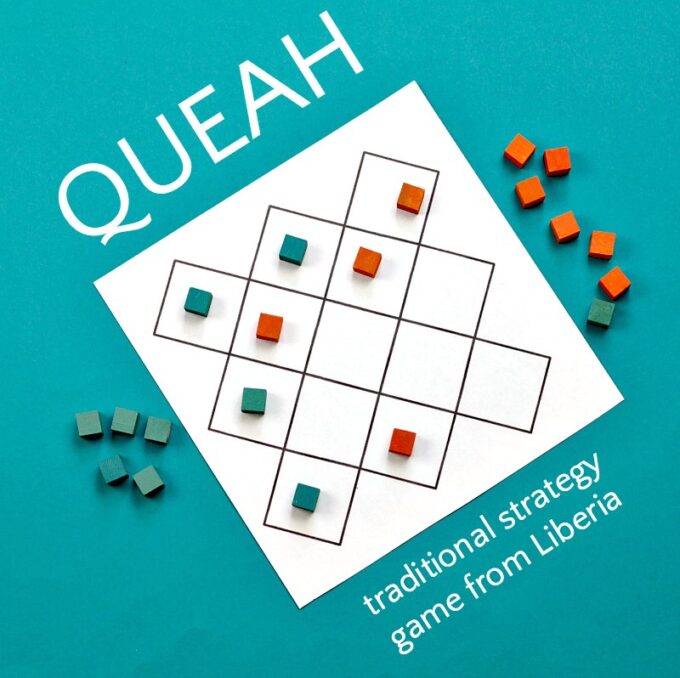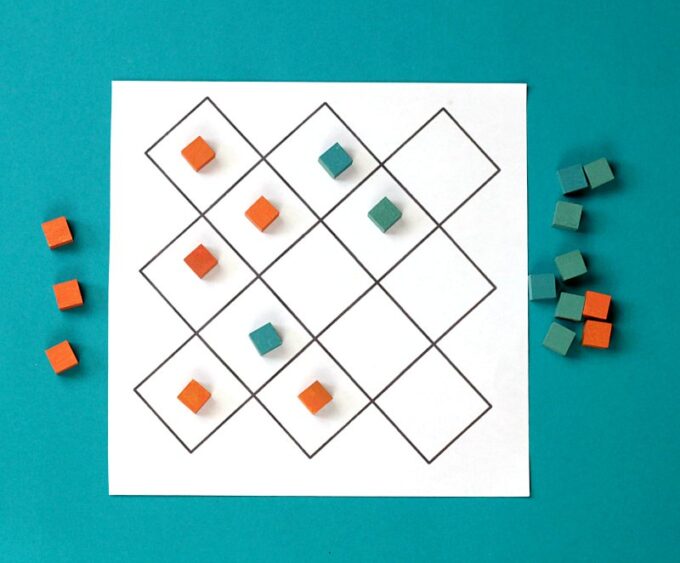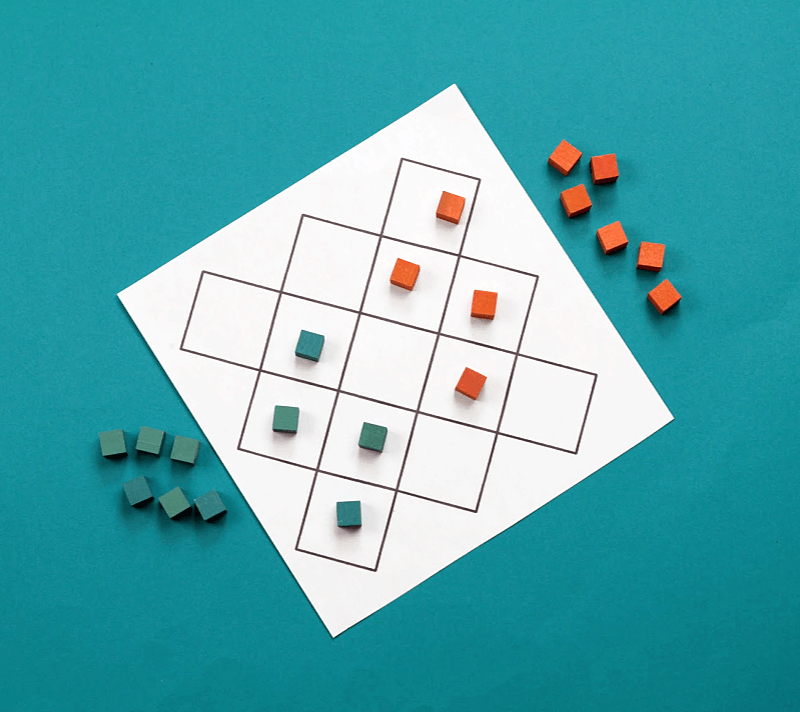Queah is a traditional board game played by the Queah people in Liberia. It is a capture-type abstract strategy game that has some similarities with checkers or draughts. It is a great boredom buster for kids and families no matter where in the world you live.

We love playing these traditional games, like Kaooa from India, or Pong Hau K'i from China and you will, too!
Watch the how to video here, or scroll down to read the written instructions.
How to Play Queah
Objective: to capture your all of your opponent's tokens.
What you need:
- Game board. Draw a grid like the one shown, or print out our free board (see end of post for form).
- 10 tokens per player. Make your own like we did out of tiny wooden cubes, or use what you can find around the house like coins, beads or beans.
- 2 enthusiastic players
Queah game instructions
- Set Up
Place 4 tokens per player on the game board as shown. Set the remaining 6 aside in reserve.
Decide who will go first. - Rules
No more than 4 tokens per player on the board at any time.
Tokens can move to an empty square that shares a side with the square they currently occupy.
Tokens can jump and capture their opponent's token. Only one token can be jumped per turn. You must jump and capture if the opportunity presents itself.
After capture the player takes one of his tokens kept in reserve and places it on the board for his next turn. He makes no further moves until his subsequent turn.
When a player has no reserve tokens left, he continues to play. Instead of replacing tokens he must play with fewer than 4 tokens.
The first player to capture all his opponent's tokens is the winner.

Variations on Queah
Encourage your children to think critically about game strategy and how game play may be different were they to alter the rules. Some questions to ask and variations to try:
- Does the first or second player have an advantage?
- When replacing a captured token, what if the player also got to make a move?
- How likely is a stalemate?
- What rule(s) could you institute to prevent a stalemate?
- Which squares offer the best advantage to tokens?
More of the best traditional strategy games from around the world:
- Dara from Nigeria, a three in a row game
- Tsoro Yemetatu, a three in a row game from Zimbabwe
- Fox and Geese, a hunt game from Europe
- Five Field Kono, a positional game from Korea
- Watermelon Chess, a capture game from China




Lata says
I really like the games that you post. Can't wait to try this one out.
Lou Smeja says
I subscribed to your email 3 times and still could not download the queah board.
I
also sent you question about the game. When replacing the token taken can it go anywhere. on the board?
Erica says
I answered your email a few days ago, so perhaps you didn't see it. You can easily draw the game board if you are having trouble downloading the game board. Yes, you can replace the token anywhere on the board. Happy playing!
Hadassah Glanz says
In the rules above it says:
After capture the player takes one of his tokens kept in reserve and places it on the board for his next turn. He makes no further moves until his subsequent turn.
Does that mean placing his reserve on the board is how he has to use his turn?
Erica says
Good question. Yes, placing the reserve on the board is how he uses his turn.
Cheryle Collins Katribe says
I wish you would publish the game boards for these dice and other games like you used to. I find it so much easier to print than to try and draw them. You used to publish the game boards, and I printed on paper. Now I would like to print on card stock, but can't find the game boards to print. PLEASE PUBLISH THE GAMEBOARDS AGAIN.
Jayn Lando says
When you say "After capture the player takes one of his tokens kept in reserve and places it on the board for his next turn." Is that the player who captured the token or the one who had their token captured?
Erica says
Good question! It's the player whose token was captured. If it's still unclear, we demonstrate exactly how this workd in the video. I hope this helps.
Daniel Goffinet says
Bagha Chal (= "tigers n goats") is also a wonderful board game for "thinkers"